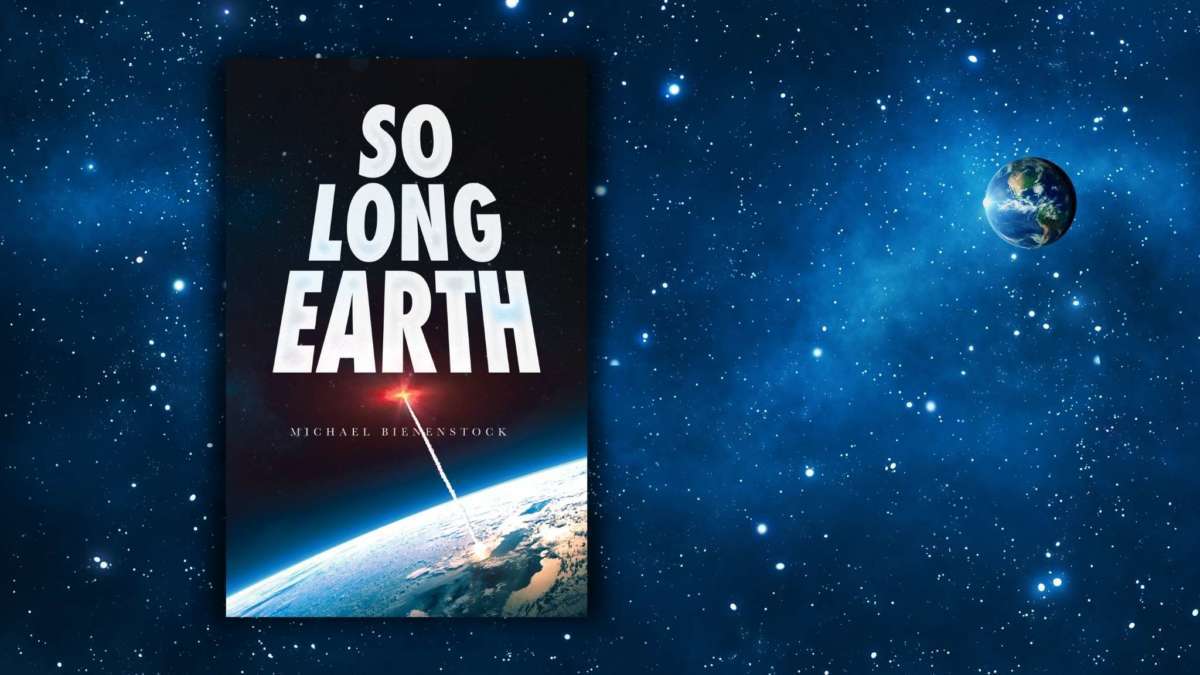Every year, we hear ever more dire news about the effects of climate change on our environment and the dwindling chances we are squandering to alter the planet’s collision course with disaster. What will we do when those chances run out? asks author Michael Bienenstock in his sci-fi adventure, So Long Earth.
Scientist Dr. Tom Burns is done with waiting. He has evaluated the catastrophic climate situation and concluded the only action left to save the human race and “enjoy a full life” would be to leave Earth behind. Ditching his high-level job in the aerospace industry, Burns takes on the complex and decades-long task of overseeing a massive project of his own initiative — designing and building a spaceship capable of carrying 1,000 crew and passengers on a pilgrimage to the nearest star system, Alpha Centauri.
A MONUMENTAL UNDERTAKING
The story opens in the Trump-era when Burns makes an attempt to seek federal cooperation. Trump refuses, denying global warming — surprise, surprise. Trump infuriates Burns, who laments, “Gone were the days of reasonable conversations.”
Burns does, however, manage to convince three other countries to join the project, including a Russian team whose terms of negotiation are highly suspect: “President Putin is ready to offer each of you five billion dollars to help you build your spaceship in exchange for guaranteeing the name will be New Russia, and he will be its supreme ruler. You do not even have to repay the money.”
The extreme challenges of Burns’s endeavor are many, technically and emotionally. The level of funding and expertise required is daunting. The time frame is impossibly tight. Leaving Earth — and billions of people — behind in order to save the human race is a sobering burden to carry.
The intellectual and emotional toll is felt by Burns, his family and crew members alike. His eldest son, Sam, is faced with the prospect of becoming “the first person to turn 21 in space.” He and his friends, whom Tom has also recruited for the mission, try to imagine what their lives will be like aboard a spaceship and wonder whether they will ever find another place to live.
Various aspects of the project are described in detail, especially the training required by the entire crew to “promote effective communication, team dynamics, decision-making, problem-solving, and leadership.” The latter is a constant theme in the book, not only in the portrait of Trump as an atrocious example of bad leadership but also in the positive leadership qualities shown by Dr. Burns and the growing leadership qualities of Sam, whom Burns has selected to one day replace him as captain of the spacecraft.
SO MANY PROBLEMS TO SOLVE, SO LITTLE TIME TO SOLVE THEM
For readers who like their sci-fi laced with actual science, there is the perplexing engineering issue of achieving the velocity needed to reach their new home. And perfecting the medical means to stay alive until they get there, including technologies such as cryogenics, stem cell regeneration and cloning. The world’s first human clone, Epoh, is brought on board, who “only has desirable traits” and is “a bit stronger than we expected and still growing.”
The ship is also well stocked with DNA samples, including those “from every past president, famous inventors, scientists, and armed forces personnel,” ready for cloning as well. The shock of these technologies is felt by the crew, especially the children. Sam asks, “Dad, am I cloned now?”
All of this serves as a scientific and emotional backdrop to the urgency of the mission. The construction of the massive spaceship becomes a race against time as climate change ramps up to cataclysmic proportions — volcanoes explode, the San Andreas Fault ruptures, and the United States and Russia are preparing for war. Will they launch in time? What will go wrong? Can the clone on board be trusted?
So Long Earth takes us on a journey down a road we may find ourselves on in the not-so-distant future should climate change spiral out of control. What’s clear from Bienenstock’s tale is that it will take just as much hard work and heartache to leave the planet as it will take to try to save it. So why not try to save it while we still have the choice?
https://booktrib.com/wp-content/uploads/2020/11/IMG_E0018-scaled-1.jpg
About Michael Bienenstock:
Michael Bienenstock is a retired teacher with over 35 years of teaching experience. He has published papers and given numerous presentations. He has earned a Bachelor of Science degree from Rochester Institute of Technology, a Master’s degree from Gallaudet University and a Ph.D. in Special Education from the University of Maryland at College Park. He is married with one son and lives in Florida. So Long Earth is his debut novel.




